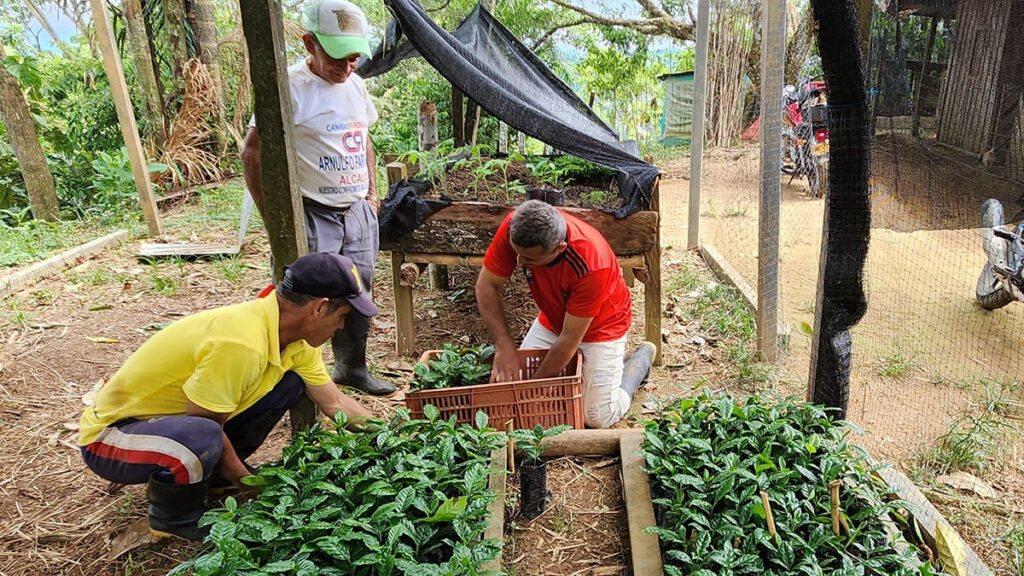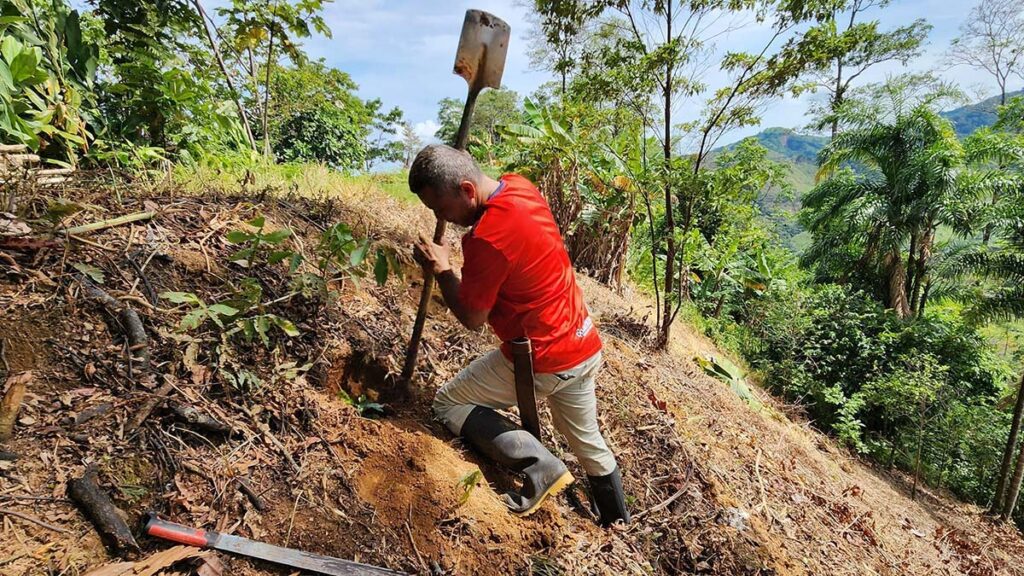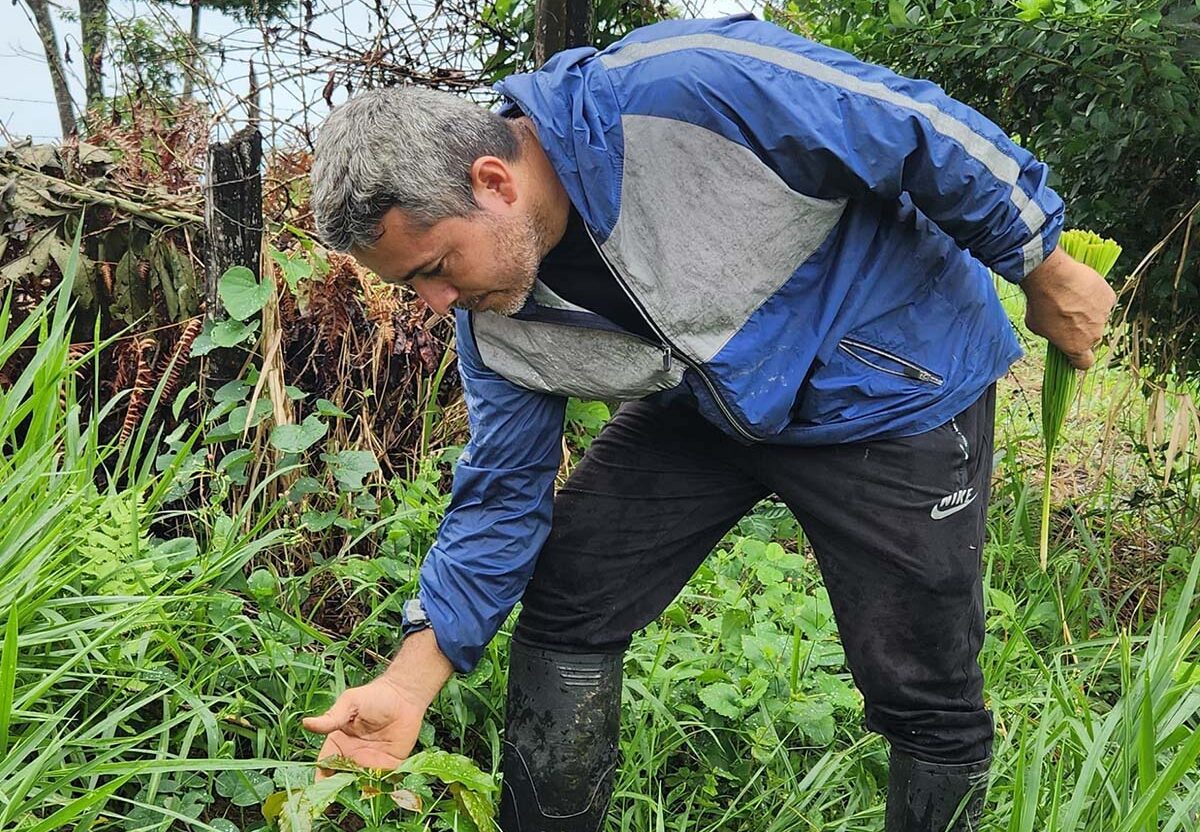Fidel Hernández works with Amazonia Connect to grow high quality coffee on his farm in Colombia.
Fidel Hernández has worked for 14 years as a preschool and primary school teacher at the Platanillo Rural Educational Institution in San José del Fragua in Caquetá. Education is a critical component of the Amazonia Connect programme’s effort to promote agricultural practices that improve biodiversity conservation and climate resilience in Brazil, Peru and Colombia. Consequently, Fidel’s background has been a benefit to his work as a promoter for the initiative as he passes on newly learned skills to nearby coffee growers.
Fidel comes from humble beginnings. In his youth he worked for daily wages on plantain, cassava and corn plantations where he learned about clearing and fertilizing the land and the hard work it takes to plant crops.
With the arrival of Amazonia Connect in his community, he seized the opportunity to renew his family’s bond with farming. He decided to make a start as a coffee grower on his own land. Each day, after teaching at school, Fidel makes a half hour trek by motorcycle to his farm, where he has cultivated 2,100 coffee plants and shares learnings about low-carbon agriculture with his neighbors.
A family crisis leads to a love for coffee
Fidel and his wife, Jesica Paola Gómez, have an 11-year-old son and 8-year-old twins. Jesica was the first to join Amazonia Connect, but she stepped back when one of their children became severely ill. Their son was hospitalized in Neiva, almost 300 kilometers away, and Jesica followed to care for the child.
“It was meningitis, which is very dangerous for young children. If he hadn’t received proper care, the child could even have died,” Fidel says.
Fidel opted to take Jesica’s place in the Amazonia Connect and fell in love with coffee. So much so that he became a “promoter” and now passes on all that he has learned to other producers in his area. Within the Amazonia Connect programme, promoters are lead farmers who build connections within their communities in order to report on newly gained technical knowledge.

“In San José del Fragua there are many people who are involved in coffee growing,” says Fidel, who counts on the support of his in-laws, who have moved to his farm and are helping with farm tasks.
“Although one may think that coffee would not grow well in these low altitudes (with an average altitude of 540 meters and average temperature of 27°C), we are showing it is possible. You have to fight a little, but it does work,” he says.
A teacher amidst the coffee farms
On days when he doesn’t work at the school, Fidel brings the classroom to his farm. While there he invites neighboring small-scale farmers to learn about low-carbon agriculture practices that result in high quality production while avoiding deforestation.
His own children have learned about coffee cultivation, from planting and caring for the seedlings, to keeping weeds under control and fertilizing the soil to provide needed nutrients.
This has been a very good experience for my children, because they are learning how to take care of the fields. The less damage you cause to nature, the more you will benefit later. Coffee is a crop that needs shade, so the trees should not be cut down, but rather planted and protected.
Fidel Hernández, coffee grower from San José del Fragua, Caquetá, Colombia
Fidel believes that Amazonia Connect can also have an impact among young people in the region. Thanks to lessons from the initiative, boys and girls with an interest in farming are able to recognize coffee as a profitable alternative to the cultivation of illicit crops that have been grown in the region.
Even producers who have been growing coffee longer than Fidel are finding his information useful. His deft skill as a teacher makes it easy to share expert technical advice and help growers find answers on ways to deal with fungi and pests in their plots, while improving quality and productivity.

In its second year, Amazonia Connect continues to be a catalyst for positive change in the Amazon region of Colombia. Since the start of the effort in 2022, roughly 1,500 people in Colombia have received technical training on low-carbon agricultural practices. In Colombia, Amazonia Connect is a powerful tool that promotes environmental sustainability and economic development while protecting fragile ecosystems for the future of the planet.
About Amazonia Connect
Amazonia Connect is a partnership between USAID, Solidaridad, Earth Innovation Institute, National Wildlife Federation, and the University of Wisconsin- Madison. Together with USAID’s Amazon Regional Environment Program, producers, companies, local governments and financial institutions, Amazonia Connect promotes and scales the adoption of low-emission commodity production to improve biodiversity conservation and climate resilience in Brazil, Colombia, and Peru.

